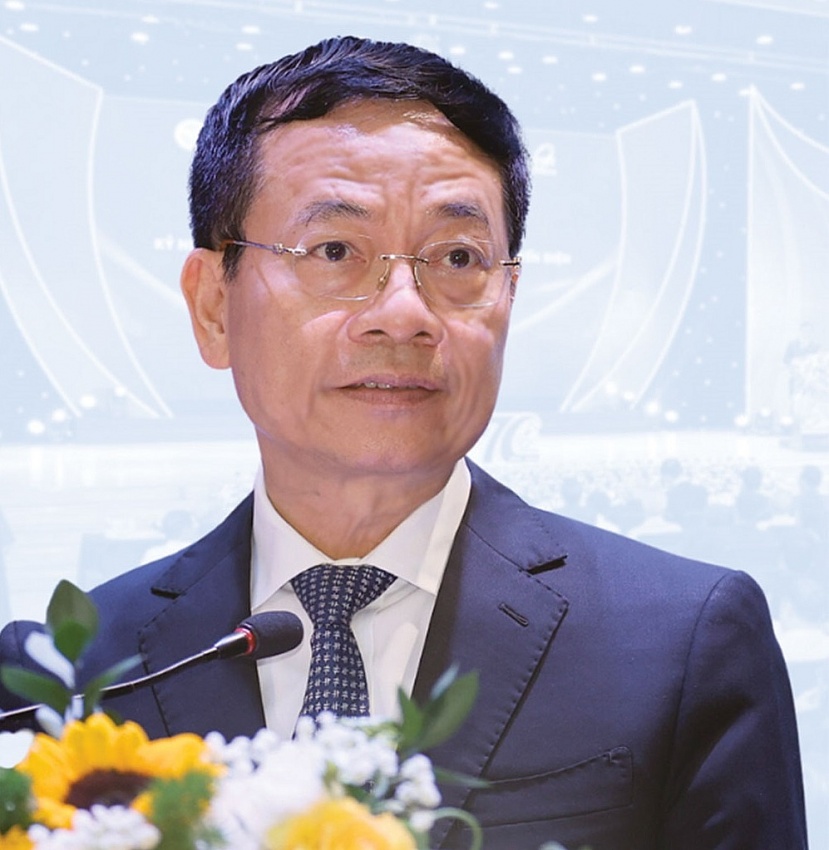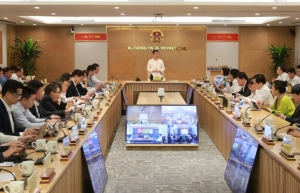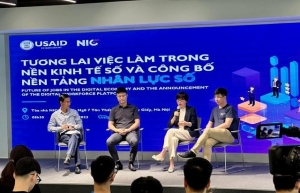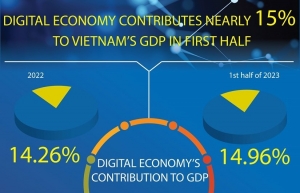INTERNATIONAL INVESTMENT
AND PORTAL
Digital economy development includes the journey of the ICT industry and the movement of the digital economy of all sectors and industries. Digital transformation is a long journey that is more about application than research. In application, ethnic characteristics, culture, country context, and the characteristics of each industry and sector are the deciding factors.
 Nguyen Manh Hung - Minister of Information and Communications
Nguyen Manh Hung - Minister of Information and Communications
This is an opportunity for Vietnamese digital tech businesses because they understand the Vietnamese context.
Developing Vietnam’s digital economy must be based on innovation, infrastructure, integrating it into all industries and fields, perfecting institutions, implementing digital management, and training digital skills and talent.
The ICT industry leads the development of the digital economy because it provides related infrastructure, tech, products, services, and solutions. It is the application of tech to traditional industries to create new output. It does not stand alone but is an economy integrated into the real economy, making the latter more efficient and of better quality.
Our world’s economy has reached a level where many physical activities are faster than non-physical activities. Therefore, the speed of the economy is now dependent on the speed of non-physical activities. These non-physical activities can go online. And when they do so, their speed will rise, and therefore the speed of the whole economy will also increase accordingly.
Production and consumption are still physical, but many decisions about production and consumption can be made online. For example, the decision to buy on an e-commerce platform is online. Delivery is still offline, but the speed of shopping activity has increased significantly. Therefore, the digital economy means quickly moving some stages online, using these stages to speed up and promote the remaining stages. Any stages of related activities that go online create a multiplier for the entire economy to grow.
In terms of governance, this can be considered as a productive relationship. It is an important component of modernising national governance using digital technology to improve the quality of public services, monitoring systems, data-based decision-making, and enhancing enforcement capacity.
Data is the new factor of production, and creating value is crucial. This includes collecting, standardising, and defining data rights as well as labelling, evaluating, exchanging, creating, and protecting data markets.
AI, especially deep learning, has experienced the discovery and research phase and has entered the application phase. Research and discovery require elites to spend decades of effort to make a breakthrough. The US and some developed countries are still the main players in the research and discovery phase. Vietnam has not participated much in this phase, but in the application phase, engineers are needed. Those who are quick to apply will benefit the most.
AI needs to be popularised and applied in every industry, every business, and every organisation. To do so, it must be turned into a service and provided via telecommunications networks to all people and businesses, like mobile phone services, at a cheap price. To develop AI healthily, the government will soon issue a set of application rules because AI can potentially create an even greater risk than nuclear energy.
However, that does not mean we should limit the application of AI; on the contrary, we need to accelerate the application of its positive aspects. The Ministry of Information and Communications (MIC) will submit to the government a national action programme on AI application in digital transformation, government, economy, and society. AI will help increase labour productivity, reduce product costs, and create new values. AI will play a key role in digital economic development.
To manage and promote something, you must measure it. The MIC attaches special importance to constantly measuring the digital economy at all levels.
Vietnam can become a top country in digital economic measurement, but learning from each other is still the most important factor. The MIC will synthesise good experiences on the digital economy from provinces, sectors, and countries.
 Vietnam’s digital economy sets high growth Q1
Vietnam’s digital economy sets high growth Q1
The Ministry of Information and Communications (MIC) on April 7 held a meeting to review the first-quarter performance and set future tasks.
 Launching digital workforce platform for IT human resources
Launching digital workforce platform for IT human resources
The digital human resource platform provides the most up-to-date information about the job market, orienting the future career development trends for young people.
 Digital economy contributes 15 per cent to GDP in H1
Digital economy contributes 15 per cent to GDP in H1
Vietnam’s digital economy has played an important role in the country’s socio-economic development in recent times, and accounted for nearly 15 per cent of GDP in the first half of this year, according to the Ministry of Information and Communications.



















